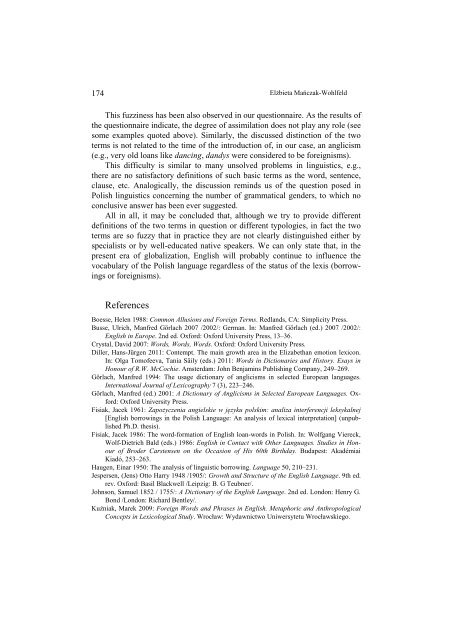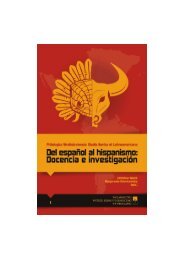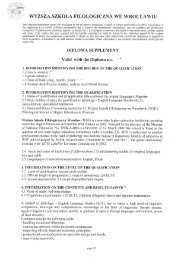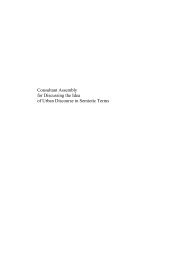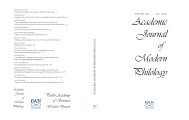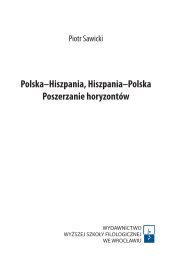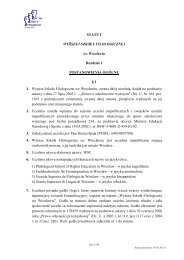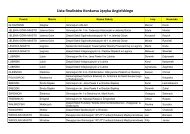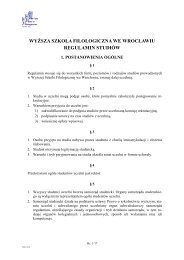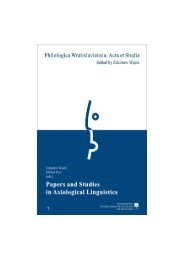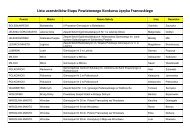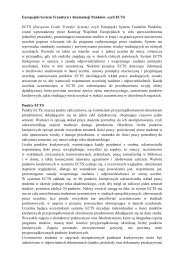s - Wyższa SzkoÅa Filologiczna we WrocÅawiu
s - Wyższa SzkoÅa Filologiczna we WrocÅawiu
s - Wyższa SzkoÅa Filologiczna we WrocÅawiu
Create successful ePaper yourself
Turn your PDF publications into a flip-book with our unique Google optimized e-Paper software.
174<br />
Elżbieta Mańczak-Wohlfeld<br />
This fuzziness has been also observed in our questionnaire. As the results of<br />
the questionnaire indicate, the degree of assimilation does not play any role (see<br />
some examples quoted above). Similarly, the discussed distinction of the two<br />
terms is not related to the time of the introduction of, in our case, an anglicism<br />
(e.g., very old loans like dancing, dandys <strong>we</strong>re considered to be foreignisms).<br />
This difficulty is similar to many unsolved problems in linguistics, e.g.,<br />
there are no satisfactory definitions of such basic terms as the word, sentence,<br />
clause, etc. Analogically, the discussion reminds us of the question posed in<br />
Polish linguistics concerning the number of grammatical genders, to which no<br />
conclusive ans<strong>we</strong>r has been ever suggested.<br />
All in all, it may be concluded that, although <strong>we</strong> try to provide different<br />
definitions of the two terms in question or different typologies, in fact the two<br />
terms are so fuzzy that in practice they are not clearly distinguished either by<br />
specialists or by <strong>we</strong>ll-educated native speakers. We can only state that, in the<br />
present era of globalization, English will probably continue to influence the<br />
vocabulary of the Polish language regardless of the status of the lexis (borrowings<br />
or foreignisms).<br />
References<br />
Boesse, Helen 1988: Common Allusions and Foreign Terms. Redlands, CA: Simplicity Press.<br />
Busse, Ulrich, Manfred Görlach 2007 /2002/: German. In: Manfred Görlach (ed.) 2007 /2002/:<br />
English in Europe. 2nd ed. Oxford: Oxford University Press, 13–36.<br />
Crystal, David 2007: Words, Words, Words. Oxford: Oxford University Press.<br />
Diller, Hans-Jürgen 2011: Contempt. The main growth area in the Elizabethan emotion lexicon.<br />
In: Olga Tomofeeva, Tania Säily (eds.) 2011: Words in Dictionaries and History. Esays in<br />
Honour of R.W. McCochie. Amsterdam: John Benjamins Publishing Company, 249–269.<br />
Görlach, Manfred 1994: The usage dictionary of anglicisms in selected European languages.<br />
International Journal of Lexicography 7 (3), 223–246.<br />
Görlach, Manfred (ed.) 2001: A Dictionary of Anglicisms in Selected European Languages. Oxford:<br />
Oxford University Press.<br />
Fisiak, Jacek 1961: Zapożyczenia angielskie w języku polskim: analiza interferencji leksykalnej<br />
[English borrowings in the Polish Language: An analysis of lexical interpretation] (unpublished<br />
Ph.D. thesis).<br />
Fisiak, Jacek 1986: The word-formation of English loan-words in Polish. In: Wolfgang Viereck,<br />
Wolf-Dietrich Bald (eds.) 1986: English in Contact with Other Languages. Studies in Honour<br />
of Broder Carstensen on the Occasion of His 60th Birthday. Budapest: Akadémiai<br />
Kiadó, 253–263.<br />
Haugen, Einar 1950: The analysis of linguistic borrowing. Language 50, 210–231.<br />
Jespersen, (Jens) Otto Harry 1948 /1905/: Growth and Structure of the English Language. 9th ed.<br />
rev. Oxford: Basil Black<strong>we</strong>ll /Leipzig: B. G Teubner/.<br />
Johnson, Samuel 1852 / 1755/: A Dictionary of the English Language. 2nd ed. London: Henry G.<br />
Bond /London: Richard Bentley/.<br />
Kuźniak, Marek 2009: Foreign Words and Phrases in English. Metaphoric and Anthropological<br />
Concepts in Lexicological Study. Wrocław: Wydawnictwo Uni<strong>we</strong>rsytetu Wrocławskiego.


